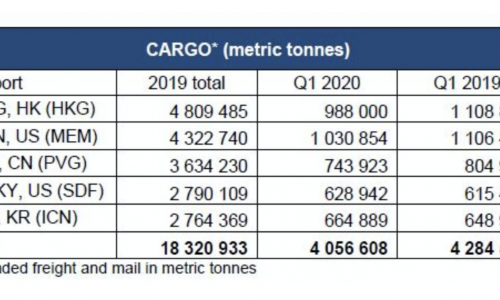
Emirates SkyCargo used the cargo capacity on its Boeing 777 freighter and Boeing 777-300ER passenger cargo-only aircraft to help maintain food supplies in the UAE during the Covid-19 pandemic.
The Middle Eastern carrier has helped import more than 34,000 tonnes of food into the country between January and April 2020, out of which 13,000 tonnes were imported between March and April.
In the month of April alone, Emirates SkyCargo helped bring in food supplies into the UAE from over 35 countries around the world.
Nabil Sultan, Emirates Divisional Senior Vice President, Cargo, said: “Despite the severe reduction in the number of flights we operate and the resultant reduction in the amount of cargo capacity we can work with, we have given top importance to maintain food supplies in the UAE as we consider this our responsibility.
“Through our regular cargo flights from major food production markets such as Australia, Egypt, India, Kenya, Pakistan and many other nations, we have been able to import quality food items.”
Emirates SkyCargo is currently operating flights to around 60 global destinations on a scheduled basis and to many more destinations as charter and ad hoc operations. Food bound for the UAE is loaded on these flights from markets across the world.
Some of the food imports that Emirates SkyCargo has facilitated since the start of the year include:
- More than 5,200 tonnes of food from Australia including chilled meat and fruits such as grapes and melons
- Close to 2,500 tonnes of food from Egypt including fresh fruits such as strawberries, guavas and vegetables including sweet potatoes
- More than 4,000 tonnes of food from India including fresh vegetables and fruits
- More than 2,500 tonnes of food from Kenya including fresh fruits such as pineapples and mangoes and meat
- Close to 1,600 tonnes of salmon from Norway
- Over 4,500 tonnes of food from Pakistan including chilled meat, fish and vegetables
Last week, Emirates announced that it would be working with the Australian government to facilitate exports of Australian agricultural and sea food commodities.

